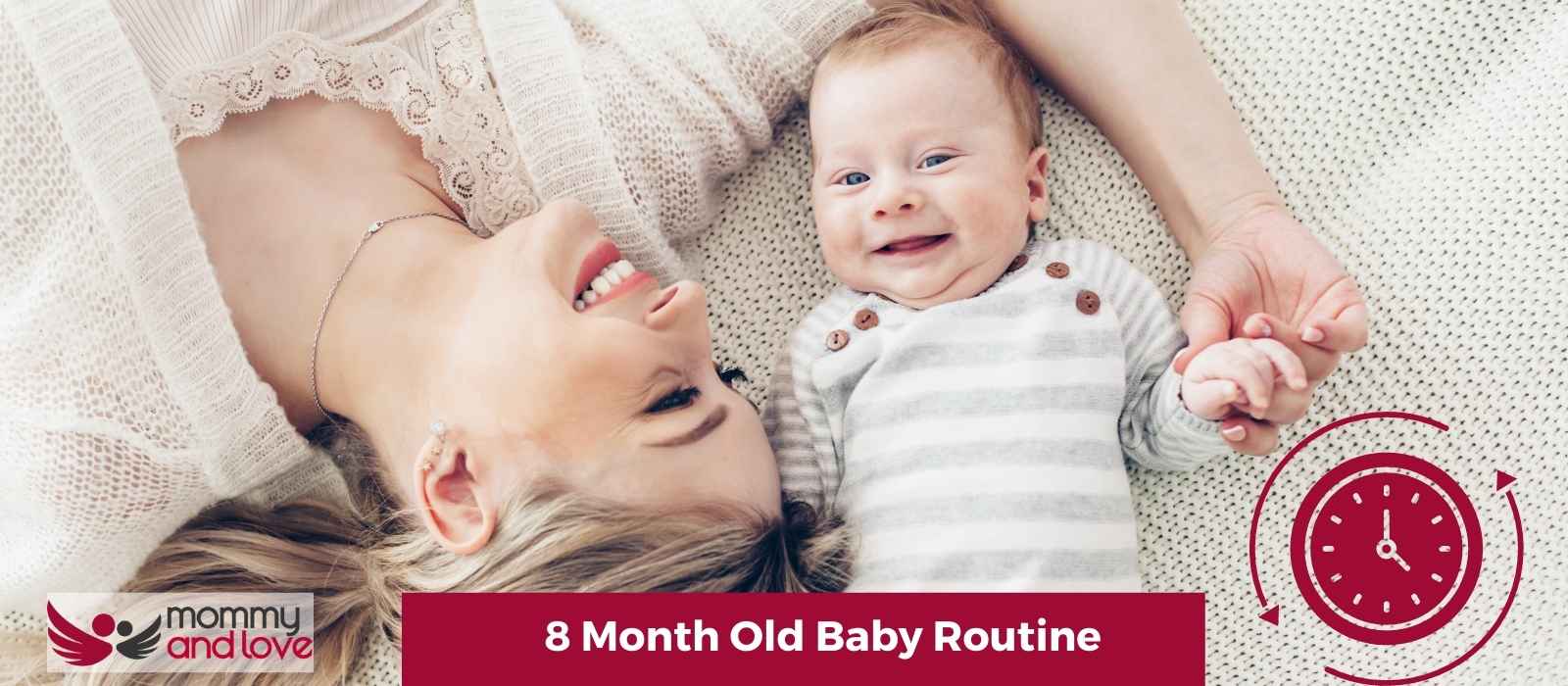Eight months is one of the most enjoyable times of your baby’s first year. They’re really beginning to develop a little personality and they’re also learning new things every day. That said, it can also be a challenging time in terms of routine as your baby’s needs are changing all the time.
With the introduction of solid foods, fewer naps, and more versatile play, there’s a lot to think about to ensure your baby has their needs met every day.
But of course, you also need to make sure that you have a routine that fits in with your schedule. Your baby’s needs will come first but now is the time that you might feel as though it’s a little easier to start going on outings and meeting up with friends for playdates.
If the whirlwind of being a new parent has got you wondering what the best eight-month-old baby routine is, then you’re in the right place.
Key Takeaways
It’s hard to believe that your baby is already 8 months old, isn’t it? It seems like just yesterday that they were a tiny newborn and the word routine could hardly be applied to any day of the week. But now, things are a little more established so we’re going to look at how to best set a routine for your little one at eight months.
- At eight months old, babies should be sleeping between 12 and 16 hours a day. This is spread across daytime sleep and nighttime sleep.
- Most 8-month-olds will need between two and three naps during the day with each nap lasting 30 to 45 minutes.
- Babies at this age should still be having around 600ml of milk each day which can be spread across four feeds.
How Many Naps Should An 8-Month-Old Baby Have?

All babies are different and their nap schedules will also be different. But as a rule of thumb, you can expect an eight-month-old baby to be having between two and three naps a day.
The length of these naps will vary. You may find that your child has around an hour in the morning while their after-lunch nap is considerably longer than this. While some 8-month-olds will stop at two naps, there are others that will have a third nap but this will probably be more like a power nap and won’t usually last longer than 30 to 45 minutes.
At this age, I would recommend not allowing your baby to nap for a very long time during their final nap of the day as there is a chance that this could interfere with their nighttime sleep.
That said, I’d also never recommend trying to force your baby into staying awake. They will only end up being grump and potentially overtired which will make life unpleasant for you both.
How Long Should An 8-Month-Old Baby Sleep At Night?
Amazingly, the Sleep Foundation tells us that as many as 38% of babies are not sleeping through the night by the age of six months. So, if your eight-month-old baby is still waking at night then this really is nothing to be worried about.
Your child still needs the same amount of sleep each day as they have done for the last few months. Most babies at this age will need between 12 and 16 hours but this is spread across daytime sleep and nighttime sleep.
How long your baby sleeps at night may impact or even depend on the number of naps in their daytime routine. But a lot of babies are sleeping through the night by this point with a typical night’s sleep lasting from 7 pm until 7 am. But as I mentioned, do not kick yourself if your baby isn’t quite there yet. Night wakings at this age are still very normal.
If you want to encourage your 8-month-old into sleeping well at night then one of the most essential things is to establish a good bedtime routine. This isn’t necessarily going to go swimmingly every night but by instilling it early on, you’ll have more luck down the line.
Feeding Schedule For An 8-Month-Old Baby

Aside from having a good sleep and nap schedule, another thing that a lot of parents want to know is how to come up with a good feeding schedule. At eight months, your baby will have likely moved onto solid food but will still be heavily reliant on regular milk feeds.
This can make feeding your baby much more interesting as you watch them enjoying new tastes and textures. But at this age, you cannot expect them to sit down and have three uninterrupted meals a day. It’s all about letting them explore food; they’re still going to be getting a lot of their nutrition from breast milk or formula.
Listen to your baby’s cues in order to figure out what they need. There will be some 8-month-old babies that happily enjoy a solid three-meal routine each day whereas others may still only have a single solid meal every day. Allow your child to lead the way. The best thing that you can do is to offer a variety of new foods for your baby to try and, with time, they’ll naturally fall into a routine.
Solids vs Milk
As I have discussed, how your baby takes to solid food will be a very personal and unique thing. My eldest child took to almost every solid food I offered him at six months and was eating like a regular adult by the age of one. But my second child was the complete opposite and wasn’t interested in solid foods, having just a small amount of baby food along with her milk.
The key is to introduce small amounts of new foods and make sure that your baby is still having a regular milk feed. Keep an eye on your baby’s diapers as well as having them regularly weighed. While there is no right or wrong amount of solid food at this age, it’s important to keep track of what they’re eating.
Babies require nutrients from breast milk or formula exclusively for the first six months. After that, it is recommended that milk remains a staple part of their diet for up to 24 months, with the amount being gradually reduced.
At eight months old, babies should still be having around 600ml of milk each day. How often they have a milk feed will depend on the individual child but generally speaking, this will spread across four feeds. For babies that have trouble falling asleep, most parents would opt for a final bottle or breastfeed before bed.
Making Mealtimes Fun And Easy

One of the difficulties that a lot of parents face when trying to establish a good feeding routine for their 8-month-old baby is getting them engaged in mealtimes. Your child is used to milk feeds which really don’t require a lot of effort on their part.
Now, you’ve plopped them into a highchair with an array of new foods on the plate and most of us expect them just to get on with it. Yes, humans have a natural instinct to put things in their mouths as a baby so that’s a good start. But you can’t expect your baby to instantly take to eating solids so there needs to be a degree of patience and you should let them explore at their own pace.
You also need to be willing to put up with some mess as they learn!
To make mealtimes easier and fun for you and your baby there are a couple of things you can do.
As much as possible, try to eat as a family. This shows your baby exactly what they’re supposed to do. After all, babies learn by copying us.
Make sure that there are as few distractions as possible. If your baby has lots of toys around them, is able to watch the TV, or has any other type of distraction, this may take their attention away from eating. And it’s always good to get them into healthy dining habits from a young age.
Give your baby lots of praise and encouragement as they eat. Talk to them about what they’re doing and make this an opportunity for positive interaction.
Drinking
As well as getting your eight-month-old eating solid foods, now is a prime time to help them learn to drink from something other than a bottle.
Give them a sippy cup with each meal; you can get ones that are made for weaning so it’s easier for your child. That said, I remember the days of trying to get my children to drink from something new and this is again something that requires time and patience. Even if they simply get a couple of drips of water or juice for the first few tries, they’ll soon get the hang of it.
Fitting Playtime Into Your Routine

Your baby is now at an age where they need a lot of playtime and interaction. Their physical and cognitive development is on fire and it’s your job to nurture that. So, you need to find ways to fit playtime into your daily routine.
I used to find that spending an hour just before their morning nap and another hour just before their afternoon nap worked perfectly. However, everyone is different so you’ll need to figure out when your baby is most receptive to playtime. Again this relies on you listening to your baby’s cues.
When it comes to playtime, a lot of new parents are left scratching their heads and wondering what will entertain an eight-month-old. It’s best to keep it simple.
Your baby will likely have developed a good amount of hand-eye coordination by this age so things like blocks are ideal. Sensory toys are also important for their development as well as things like brightly colored books. You can discuss the pictures and introduce your baby to basic language.
Since your baby has likely started to crawl by now, getting down on the floor and crawling with them is a great way to entertain them and counts as exercise.
I also think that messy play, doing things like finger painting can be wonderful fun at this age and it comes under the umbrella of sensory play so it has dual benefits.
Final Thoughts
If you have been struggling to get into a good 8-month-old baby routine then you’re not alone. It can be tricky to figure out exactly what you should be doing and whether there’s any right or wrong.
The simple answer to that is there is no right or wrong. Yes, your baby will need a certain amount of sleep each day and require regular milk feeds and solid food. But aside from that, it’s all about listening to your baby and what they need.
At this stage of their lives, babies are constantly changing and some babies will develop more quickly than others. This means that they will have varying needs. This guide aims to provide you with advice on setting up the best routine for an eight-month-old. But please remember that this is only a sample schedule and you should tailor it to your specific needs.




